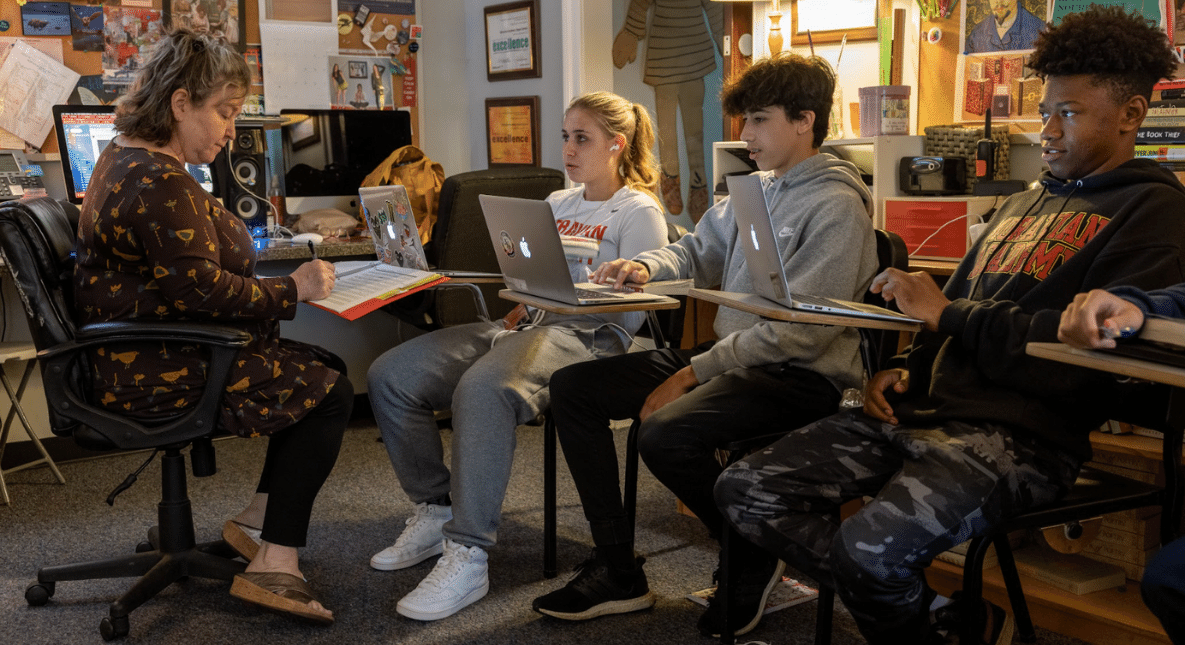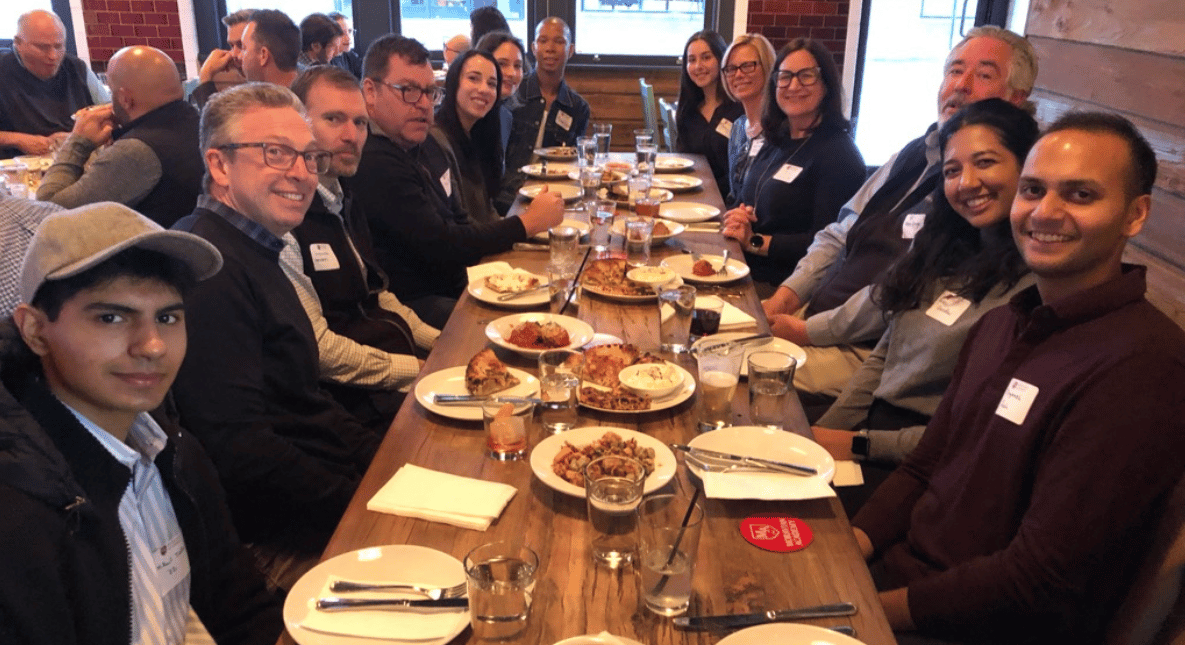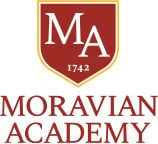Cyborgs Among Us
The rise of importance of new kinds of skills in the age of exponential technology.
It’s the year 2037. A group of Moravian Academy students in Physics class just finished talking with a leading global scientist from Germany. The scientist joined their classroom via 3D hologram technology to demonstrate new nanotechnology tools that can replace brain signals to make virtual reality seem 100% real. After school, students work on their assignments utilizing the support of artificial intelligence to help prepare for a debate on the pros and cons of downloading information from the cloud through the use of brain computer interfaces (BCI’s) and thought alone. One of the students already has a BCI installed in their brain to support a disability. Questions arise as to whether it is ethical for other students without disabilities to have BCIs surgically implanted to enhance their intellectual abilities.
Probably like many of you, as a young person I watched sci-fi films like Blade Runner and the Terminator films with amusement, but never imagined that cyborgs would be a reality in my lifetime. Technology has been advancing at a rapid pace in recent years and technological improvements have enhanced our lives in multiple ways. However, technology is advancing faster than ethics and legal frameworks can create boundaries for it.
One important field that has benefited from technology enhancements is the medical field. A recent article in Wired Magazine reported on the story of Nathan Copeland who has been wearing a BCI successfully for the past seven years. He received the BCI as part of a research study that he voluntarily signed up for because he was paralyzed from the chest down due to a car accident. The BCI translates brain signals to movement, including the ability to control a robotic arm as well as external devices with his mind. Research in this field has been accelerating in recent years, including at Elon Musk’s Neuralink corporation. Currently much of the research is focused on support for individuals with disabilities, however, the applications range far and wide.
 In an age that is being shaped in significant ways by the advances in artificial intelligence and other exponential technologies, leading schools like Moravian should consider how these developments are currently impacting the lives of the students in our care as well as how they will impact their future after they graduate. It is incumbent upon us to consider how to support student skill development to ensure that they will thrive in a world where most every job and every experience will be touched by technology. In the book Robot Proof, Northeastern University’s President, Joseph Aoun, posits, “education is not concerned solely with topping off students minds with high octane facts, rather it calibrates them with a creative mindset and the mental elasticity to discover, invent or create something valuable to society.” Dr. Aoun promotes the need to give students real world problems to solve and to assess them on their creativity, the ability to use technology to help solve problems, to ask good questions, and to collaborate with others to solve problems.
In an age that is being shaped in significant ways by the advances in artificial intelligence and other exponential technologies, leading schools like Moravian should consider how these developments are currently impacting the lives of the students in our care as well as how they will impact their future after they graduate. It is incumbent upon us to consider how to support student skill development to ensure that they will thrive in a world where most every job and every experience will be touched by technology. In the book Robot Proof, Northeastern University’s President, Joseph Aoun, posits, “education is not concerned solely with topping off students minds with high octane facts, rather it calibrates them with a creative mindset and the mental elasticity to discover, invent or create something valuable to society.” Dr. Aoun promotes the need to give students real world problems to solve and to assess them on their creativity, the ability to use technology to help solve problems, to ask good questions, and to collaborate with others to solve problems.
 The so-called soft skills that have been emphasized in recent years are essential to thriving in the new economy. I like to call them “power skills,” as there is nothing soft about them. These skills are part of what differentiates human intelligence from machine intelligence and will be essential to the innovation that is required to solve the complex problems of our time. Such skills include emotional intelligence, communication skills, the ability to problem solve, perseverance, integrity, flexibility and balance. Moravian Academy has programs across all three campuses that provide opportunities for students to develop these skills. Project-based learning, experiential learning, and real world problem solving are thoughtful aspects of the student experience at Moravian. Programs include outdoor education, interactive field trips, independent research, and public speaking among others. Each experience is crafted to enhance student engagement and advance student ability to think in critical and divergent ways. Fostering power skills, however, is not at the expense of foundational skill development which is essential for higher order thinking. Rather, we shouldn’t stop with the foundational skill development, we need to craft situations that allow students to go deeper so that they make connections that inspire innovation.
The so-called soft skills that have been emphasized in recent years are essential to thriving in the new economy. I like to call them “power skills,” as there is nothing soft about them. These skills are part of what differentiates human intelligence from machine intelligence and will be essential to the innovation that is required to solve the complex problems of our time. Such skills include emotional intelligence, communication skills, the ability to problem solve, perseverance, integrity, flexibility and balance. Moravian Academy has programs across all three campuses that provide opportunities for students to develop these skills. Project-based learning, experiential learning, and real world problem solving are thoughtful aspects of the student experience at Moravian. Programs include outdoor education, interactive field trips, independent research, and public speaking among others. Each experience is crafted to enhance student engagement and advance student ability to think in critical and divergent ways. Fostering power skills, however, is not at the expense of foundational skill development which is essential for higher order thinking. Rather, we shouldn’t stop with the foundational skill development, we need to craft situations that allow students to go deeper so that they make connections that inspire innovation.
In the years ahead we will continue to explore how our curricular and co-curricular programs at Moravian can foster the important skill development that students need in today’s landscape. We invite you to partner with us as we engage in this process. If you have expertise to offer, personal connections that will help, or want to support this important work, I invite you to reach out to share your thoughts with us.
This article first appeared in Moravian Academy's All-School Newsletter from September 21, 2022.


 myMA
myMA





.png)





